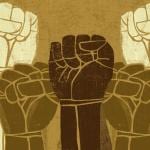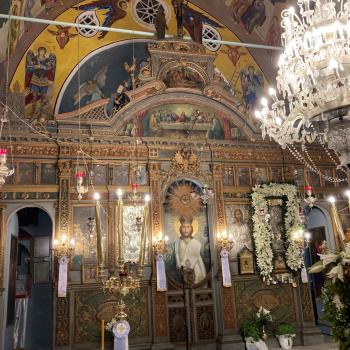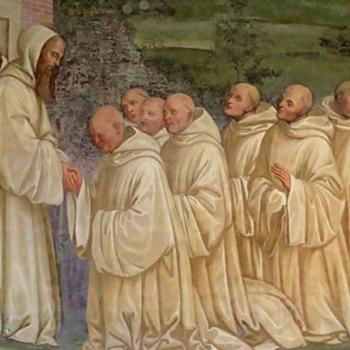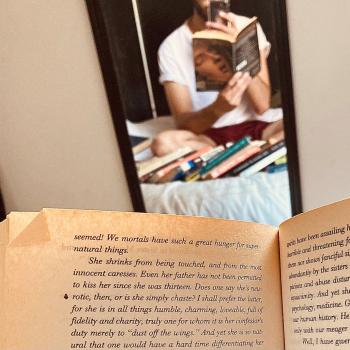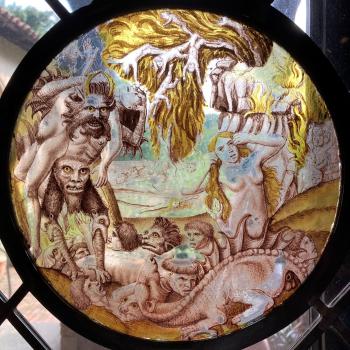Will Arbery won over critics and audiences with his play Heroes of the Fourth Turning. Through the play’s characters, Arbery offers a nuanced exploration of the beauty, pain, and humanity that often fall under the radar in the “Culture Wars.” Because this blog is dedicated to those surprising moments of transcendence that emerge from postmodern culture’s “cracks,” I reached out to ask him some questions.
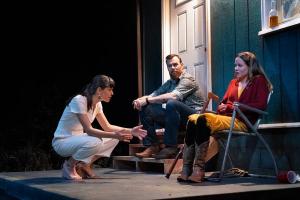
The dialogue in the play name checks a variety of authors, concepts, and historical events. Can you name some of the main books or writers that influenced you as you were writing the play?
Oh, there used to be so much more name-checking! I had to cut a lot of it. But referencing authors is a big part of the way these people talk. It’s funny, I saw one negative review that said “Arbery clearly wants us to know that he has read Heidegger, Aquinas, Brueggemann, Descartes, Arendt and Sanger, not to mention Martin Diamond and Gerard Manley Hopkins.” As much as I wish that were true, it’s not. Those names were part of the music of this play. The fact is, I’m not particularly well-read in theology or political philosophy, and I’m not an expert on any of these writers. I name-checked authors because the people in the world of the play do so. I had to make sure that the references were accurate, and I had to make sure that I understood their implications, but it’s not like I was going out and reading dozens of theological and philosophical tomes. Simply put, there’s a difference between influences for the play and influences for the characters. Some of my own theatrical influences are Maria Irene Fornes, Wallace Shawn, and Caryl Churchill. All of those playwrights are able to create haunting theatrical experiences whose structure imitates the ideas in the work. They’re all fearless writers. I was also influenced by the work of Claudia Rankine and Namwali Serpell. But the characters are, of course, Catholic conservatives. Emily is a devotee of Flannery O’Connor, especially her prayer journal. Gina is a political mind, with deep conservative credentials, but also clearly a reader of Gerard Manley Hopkins. For contemporary conservative thinking, I read The Benedict Option by Rod Dreher, Why Liberalism Failed by Patrick Deneen, and I dipped into Jordan Peterson, Barry Goldwater, Pat Buchanan, Steve Bannon, and the magazine First Things. And of course Plato, Aristotle, Thucydides, Homer, Augustine… all of the classical writers who form the spine of the curriculum these characters shared. None of those names were inspirations on the actual form or feel of the play. For the play itself, I was simply trying to capture the feeling of the Wyoming night, and five specific souls within it. The one writer who bridged the gap between aesthetic influence and character influence was Hannah Arendt. Her writing, especially on empathy and imagination, became a big touchstone for some of the debates, as well as my own thinking about the play’s work in the world. And I like to believe she had an influence on some aesthetic elements of the piece as well.
As I was sitting in the audience, I was trying to gauge the demographics of the crowd…both by visual observation but also by listening to their reactions to certain moments in the play. I have to say it was hard to categorize the kinds of people there. Were you trying to reach a particular audience? Are you surprised by the kinds of people who came?
Yes, that was an electric room to be in. I was so pleased to see that the play appealed to such a wide spectrum of people. But I also made an effort to make sure that happened. The play was for anyone who wanted to be challenged, who wanted to wrestle in an intimate, uncomfortable way with the minds and hearts of five particular people. And I’m pleased that the work invited radical leftists and queer activists to share the same space as neo-cons and integralists. What a wild thing. I think most audience members were just theater-lovers. But I think audience members from the far left were refreshed by the truths that the play was telling about the way whiteness and conservatism operates in this country. And I did make a concerted effort to invite more Catholics & conservatives into the theater. I wanted to create a conversation, or at the very least, a space to gather, and that took some outreach. There was a stretch of about a week, during previews, when the play got some key conservative endorsements and some key progressive endorsements… and I knew this was going to be a beautiful experiment.
What struck me most about the play was that you presented the depth and humanity behind certain ideological archetypes. When one peers behind the ideological label, you begin to see the complexities of each person, as well as the experiences that lead them to take on a particular ideological position. I think the proliferation of social media sound bites and buzzy news headlines make it harder for us to look at the nuances of others’ experiences, as well as of our own. Can you share a little bit about your experience of making sense of your own identity, beyond the confines of archetypal categories?
I’m still trying to make sense of my own identity. So much of my work is about trying to be honest about my identity. Or: vulnerable, broken, weird about my identity. My work will be perceived and evaluated against the backdrop of my whiteness and my maleness, and I like those terms. I try to embrace them in a way that’s rigorous, surprising, and honest. And the way I do that is by running headfirst into my fears. Or wading into the unknown. Sometimes that looks like writing about the Catholic faith, and about the very specific strain of American conservatism which my parents have spent their lives practicing. Sometimes that looks like writing about my seven sisters, their navigation of a system designed to limit their autonomy, my own maleness in contrast to that, or my loneliness, or my sexual paranoias, or my various inherited pathologies. I don’t know what else to say. All I know is that I’m still searching. And that I hate being categorized, but that I try to accept that it’s inevitable. I’m trying to make sense of it all. I’m in love with the world. I want to bring goodness and tenderness into the world. But you can’t have love as your praxis without being honest about where you come from and the fullness of who you are. And so I’m constantly pushing deeper into both the mystery and the facts of my identity. And, as different from me as they usually are, my characters are doing the same.
Three out of the four main characters seemed to be afraid of engaging with people on the “other side.” This reflects the reality for many Americans who tend to partition themselves off into like-minded friend groups. Why do you think we are so afraid of encountering people who have different points of view?
I don’t know which three you’re referring to, but I think it’s only one, Kevin, who’s really afraid. Teresa’s made her living out of engaging with the other side, and despite the extremism of some of her views, I think she actually immerses herself in the depth of their thinking. Emily has friends and loved ones on the other side (“people who work for Planned Parenthood, Democrats, a drag queen I know…”). Teresa seizes on Emily’s assertion that these people can be “good,” and argues that they are, in fact, the opposite of good, because they support the “genocide” of abortion. But she doesn’t argue against engaging with them. Kevin seems to be the one character who seems genuinely afraid of engaging. He can only do it on Facebook. He’s afraid because he thinks he might become one of them. And he categorizes “them” as being unanchored from Christ, with their “phones and their porn and their astrology and their orgies.” Then there’s Justin, who argues that the Right should just ignore the Left all together, and “focus on the Lord.” I don’t think he’s doing this out of fear. I think he just sees the futility in the debate. Because each side is firmly entrenched in their absolutes. Because those absolutes are opposed to each other. Because it might be Sisyphean to believe that other people can change. Because we want to know who our tribe is. Because, when we learn that someone disagrees with our core values, our body starts to catalog them as a physical threat. Because we’re sold a narrative of irreconcilable divides. Because we’re so impressionable. Because we’re hardwired to crave the adrenaline of arming ourselves against the threat outside the village. Because otherwise, what? We walk out into that dark unknown space, to meet that “threat,” to speak to it? It feels oddly transgressive to practice negative capability. It’s disorienting to have your belief in something shaken, which is what you have to do in order to listen. People worry that the stability of their conviction will never come back, if they let it slip. And it’s disturbing to imagine people who are not bothered by the absence of your truth. I think of the poem “Parable,” by Louise Gluck:
each
further issue we debated equally fully, the arguments going back and forth,
so that we grew, some said, less flexible and more resigned,
like soldiers in a useless war.
And as beautiful and true as that is, it’s crucial to recognize the very real stakes that are motivating both sides. The way someone proclaims Black Trans Lives Matter is rooted in the urgency of a life-0r-death fight. But the same urgency is visibly emanating from the people at a March for Life. They’re all motivated by this fight for life. And the fact that they’re unable, as of right now, to meet in a shared space, is heartbreaking. Something is terribly wrong with a society when its inhabitants have to parse various lives and the degrees of their mattering. God, help us listen to each other. Help us protect each other. Let us hear that growing call from outside as being us, us in need, not a threat. And let our egos die.
Some moments in the play left me with a sense of how unattractive religion can be when reduced to an ideology. Have you encountered anyone who lives Catholicism/Christianity in an attractive or interesting way? Have there been any specific people who have shown you love across ideological boundaries?
Yes, of course, I’ve met a great many people who live their faith in beautiful ways. And I encounter love across ideological boundaries every single day. Truly, I’m in love with the world, and I see love everywhere. It might sound cheesy, but it’s true. I see more love across ideological boundaries than not. The fact that there is still injustice, despite such love, that there is still systemic oppression — that’s what feels important to confront. I do sometimes have the stupid hope that if someone learns that their love, that their love of goodness, can be made deeper and better and truer by supporting the fight against oppression, then they will eventually do that work. (Or at the very least let that work happen, with a vote, perhaps.) But the fact is that of course they already know. We all know our love can be better. Still, the fact is that there are those who claim to love this country and meanwhile actively work to perpetuate oppression. And yes, they need to be exposed. I also think that we’re all complicit in that perpetuation, truly. But that assertion can often cause people to grow resentful, to entrench themselves further in their “side.” And the idea that we’re all complicit can also breed a strange complacency, because it’s so ingrained and unconscious that it feels impossible to change. I’m rambling now. All I know is there is a vital need for a brutal confrontation with our country’s addiction to its “free market,” to its greed. It’s rotten. What I want, and what I do think is possible, is for anyone of good conscience (of which there are many many Christians) to acknowledge this rottenness.
Emily’s character seemed to me to be the embodiment of the image Pope Francis uses of the Church as a “field hospital” for tending to the wounds and struggles of contemporary men and women. What do you think it takes for someone to develop that kind of mentality toward people outside of the Church? In your opinion, what makes it hard for some Catholics to recognize the humanity of someone who does or believes things that are contrary to their faith?
I don’t actually believe that it’s about recognizing humanity. That’s a phrase that gets used a lot, and while there might be some truth to it, I think the reality is that most people do recognize each other’s humanity — the question is about what they do with that recognition. One of Patrick Deneen’s points in Why Liberalism Failed is that the political debate today is about borders vs. borderlessness. I believe a lot of contemporary religious conservatives believe in the necessity of strong borders (political, geographical, sexual). While they might recognize the humanity of those on the other side of the border, they have trained themselves to prioritize the needs and beliefs of the community inside their own border. In fact, many conservatives pride themselves on treating the “other side” with more humanity, in their refusal to victimize them or paternalize them or assume that they can’t take care of themselves. It might sound like twisted logic, but I haven’t encountered many moral qualms about this attitude. Because the fact is: they are convinced that these “wounds and struggles” are rampant within their borders as well, because everyone is being essentially infected by diseases (literal, moral, spiritual) from outside the borders. So, they say, we must first prioritize healing our own. I think that’s essentially the standpoint. And I don’t know what it would take for people to develop a “field hospital” mentality for those outside the Church. Many do have that mentality. It might just be a natural predisposition. That might sound like a cop-out, but Jonathan Haidt’s The Righteous Mind makes a compelling argument for political views being innate in a person. I certainly feel like I’ve always been the way I am: open to a fault, watchful, eager for change while also addicted to the pursuit of negative capability. I don’t know what made me this way. But it does just feel, at times, that it’s some people’s nature to prioritize those outside the borders, and it’s some people’s nature to prioritize those within. So much debate seems to be about the legitimacy/urgency of these priorities, and whether or not they’re opposed.
I was really struck by the tension between Teresa and Gina. The characters in the play represent a lot of millennials’ experiences and concerns. In my experience, millennials are passionate about Truth and justice. We have pressing existential questions, and many of us will quickly turn to ideologies for answers/solutions. I think this is why you find things like Latin Mass and integralism popular on the right and socialism and polyamory on the left. The fear is that if we don’t go to one extreme or the other, well get stuck in the middle of the road, which is the path to emptiness, nothingness…and we are desperate to escape that. I find that I as a millennial also clash with Gen Xers over similar issues. Older people often tell me that I’m overly idealistic, alarmist, and dramatic…and that I need to get my head out of the clouds and look at reality. I feel that older people are naive about the proliferation of emptiness and nihilism brought on by their blasé relativistic attitude. But I also acknowledge that they have much more experience than me and that I need to learn from them. What can you say about the importance of intergenerational dialogue? How have your views been shaped by those who are older than you? In what ways have you felt the need to challenge the views of those older than you in order to help them understand your experience?
I love this question. And I agree. We do have pressing existential questions, and that’s why you’ll find people drawn to the absolutism of a Tridentine Mass, or the almost paradoxical Puritanism of a polyamory. Regarding the intergenerational dialogue, I don’t know what to say other than: it’s important. We should do it. All I know is that I listen to those who are older than me, just as I listen to those who are younger. Wisdom’s everywhere. Regarding the need to challenge the views of those older than me: I don’t approach it quite so combatively. It’s an ongoing process. I just try to be honest.
The final scene, when Gina seemingly calls into question her own faith and beliefs about suffering, I immediately thought of several images that Joseph Ratzinger presented in the beginning of his book Introduction to Christianity. Describing the position of the believing Christian in front of the unbelieving (post)modern world, he references Kierkegaard’s clown, who is mocked as he tries to explain to a group of people that there’s a fire burning down the town. In the same way, the Christian who preaches of the need for salvation is treated as a clown act. Unless the Christian recognizes that he is submerged in the same abyss of uncertainty that the rest of the modern world finds itself in, his message will sound hollow and trivial. What can you say about the blind certainty that many Christians have toward matters of faith and social/moral ideals? Why do you think so many of us quickly come to certain conclusions without taking the time to verify the meaning/reasoning behind these positions?
I think that’s beautiful, and many people (who are much smarter than I am) referenced Kierkegaard after seeing the play. One author pointed out that Kevin, in particular, is a Kierkegaardian figure. Yes, I think you’re right to point out the blindness of that unyielding certainty in certain Christian voices. But I think the same blindness exists on the other side of the spectrum. Absolutism creates loud voices, or relentless warriors for a certain social order. I’ve noticed quite a symbiotic relationship between opposing absolutes. They need each other. They feed on the threat of each other. They need to feel like the unyielding certainty of the other side is aiming to wipe out their side, to create a society which excludes or extracts their own side. And a lot of people are not so absolute. But they plant their flag on one of the sides, because it’s socially convenient to declare allegiance. It’s not that I think the truth is “in the middle.” Not at all. But I do think it might be in the cracks. Or on an unknown plane, a place beyond language.
How has the play changed or challenged you? What have you learned from it?
This play sharpened my sense of artistic purpose. It made me realize that I’m not done telling stories about conservatives. I mean to-the-core, scarily opinionated and intelligent and human conservatives, not the vanilla consumerist “non-political” conservatism that’s infused our cultural imagination. In many ways, my work feels a bit like introducing the country to itself. And there’s a lot more work to do. That was a transformation in my heart. It sort of meant that I had to accept a civic responsibility. I’m less suspicious of the intersection between art and politics. I’m less ambivalent, less complacent. That being said, I also needed to balance the inherently political act of doing this work with an insistence on protecting the sanctity of art. I want to let art be encountered on its own terms. So I gave a lot of interviews where I refused to talk about my own beliefs or politics. It was really hard to transition into being more of a public figure. It was hard to accept that people cared what I had to say. It was a really delicate walk, because I don’t want to tell anyone what to think, and more than anything what I believe in is listening. So to be listened to? Quite strange. But all I’m really saying is: listen.
I think we all have contradictions — parts of ourselves we can’t square with other parts of ourselves, or parts which society says are contradictory, even if they don’t feel that way. Those contradictions are the key to meaningful dialogue. They create a space for truth to really enter. Because nobody’s an algorithm. We’re all walking contradictions. But we don’t want to acknowledge our contradictions, out of fear that they’ll make our side look weak, or that we’ll be subjected to ad hominem attacks. Sigh. What can I say. I’m so weary of the sides. I’m so weary of the conflict. I want us all to meet in a dark field and learn to hold each other’s mysteries.
Heroes of the Fourth Turning will be read live on Saturday July 18th at 8 pm. Click here for more info.
Cover photo from The New York Times.


